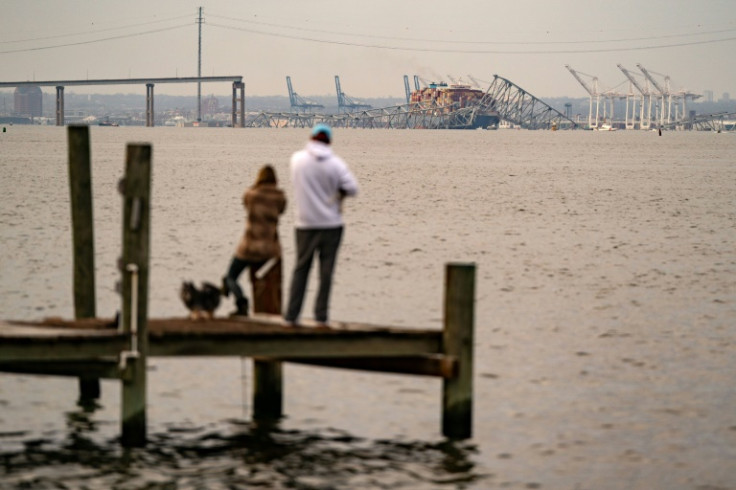
NEW YORK CITY - The bodies of two of the six presumed-dead victims of the Baltimore bridge collapse have been recovered. The six men were Latino construction workers from Honduras, El Salvador, Mexico and Guatemala. Their disappearance has raised questions and concerns about the safety of immigrant workers.
The bodies of Alejandro Hernandez Fuentes, 35, and Dorlian Ronial Castillo Cabrera, 26, were recovered from a submerged pickup truck Wednesday morning, NBC News reported. Fuentes was originally from Mexico and lived in Baltimore. Cabrera was from Guatemala and lived in Dundalk, Maryland.
Meanwhile, some of the victims' families have shared details about the lives of their loved ones.
"He fought day after day for our family to get ahead. He looked for a way to make a living," Norma Suazo told Noticias Telemundo. Sister of Maynor Suazo, a member of the construction crew that had been repairing potholes on the bridge when it collapsed, told Noticias Telemundo on Wednesday in a Spanish-language interview.
Suazo was the youngest of eight siblings from Azacualpa, a rural mountainous area in northwestern Honduras. He had worked as an industrial technician in Honduras, repairing equipment in large assembly plants, but the pay was too low to get ahead, one of his brothers, Martin Suazo Sandoval, told the Associated Press Wednesday.
"He always dreamed of having his own business," he said.
Maynor leaves behind an 18-year-old son and a 6-year-old daughter, according to his siblings.
Following the collapse of the Francis Scott Key Bridge in Baltimore from a cargo ship wreckage, authorities switched their search-and-rescue operations to one of search-and-recovery on Tuesday night, presuming that those who disappeared in the incident were now dead.
"Based on the length of time that we've gone in the search, the extensive search efforts we've put into it, the water temperature, we do not believe that we are going to find any of these individuals alive, and so this evening around 7:30, we are going to suspend active search and rescue efforts," U.S. Coast Guard Rear Admiral Shannon Gilreath said on Tuesday.
The incidents are now raising concerns from the general public about the safety of migrant workers, according to NBC.
For one, the victims' employer, Brawner Builders, a general contractor in Hunt Valley, Maryland, told CBS News about the victims' employee benefits. An executive of the company said the workers had company-sponsored life insurance, while declining to disclose details regarding the policies. Separately, a GoFundMe campaign is aiming to raise $60,000 to help their survivors.
"The company is doing everything possible to support the families and to counsel the families and to be with the families," Brawner Builders executive vice president Jeffrey Prirzker told CBS News.
Despite the Baltimore bridge collapse being unforeseen, the executive adds, construction work remains one of the most dangerous jobs in America.
Workers in the construction and extraction industries had the second most fatalities in 2022, with 1,056 fatalities across the country, followed by transportation and material moving workers, according to the most recent data from the U.S. Bureau of Labor Statistics released in December. Latinos are more exposed to these dangers since they make up about a third of the nation's construction workers.
At least 423 of these workers died due to falls, slips or trips, according to BLS. The majority of these deaths, at least 286, happened among Hispanic workers, NBC News reported.
Other tragedies involving Hispanic construction workers have taken place this year. In another Maryland town, at least three Latinos were among the six construction workers fatally struck by two drivers while in a construction zone. Two months ago in Idaho, three construction workers, two of which were from Guatemala, were killed in a building collapse in Boise.
The Baltimore bridge collapse tragedy has hit Latino and immigrant communities nationwide hard, said Bruna Sollod, senior political director of United We Dream, the nation's immigrant youth-led organization.
Sollod said in a statement Wednesday that immigrant workers who remain missing in Baltimore "have been building and repairing the bridges that ensure we can move freely throughout the cities we call home and stay connected as neighbors and families."
"Each and every single one of these men were a part of the very fabric that helps make Baltimore a thriving, vibrant and safer community," Sollod said, adding that they are "a reminder of the often unseen care immigrants pour into our cities and communities every day.
© 2024 Latin Times. All rights reserved. Do not reproduce without permission.







